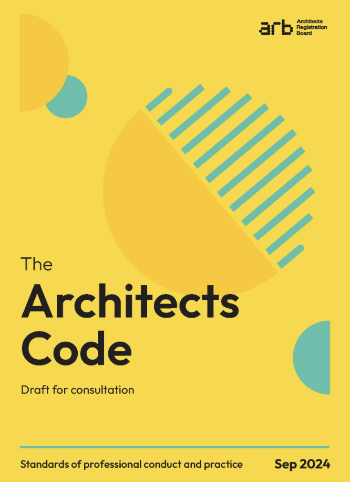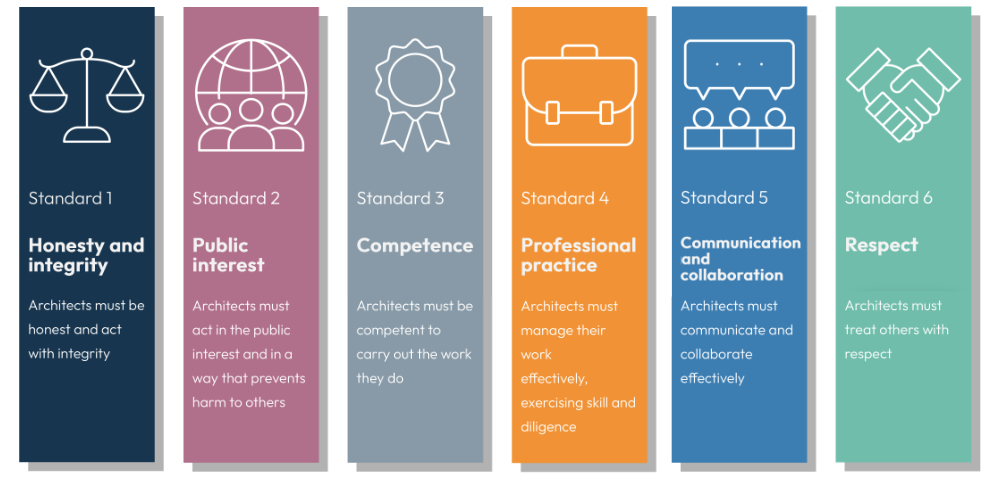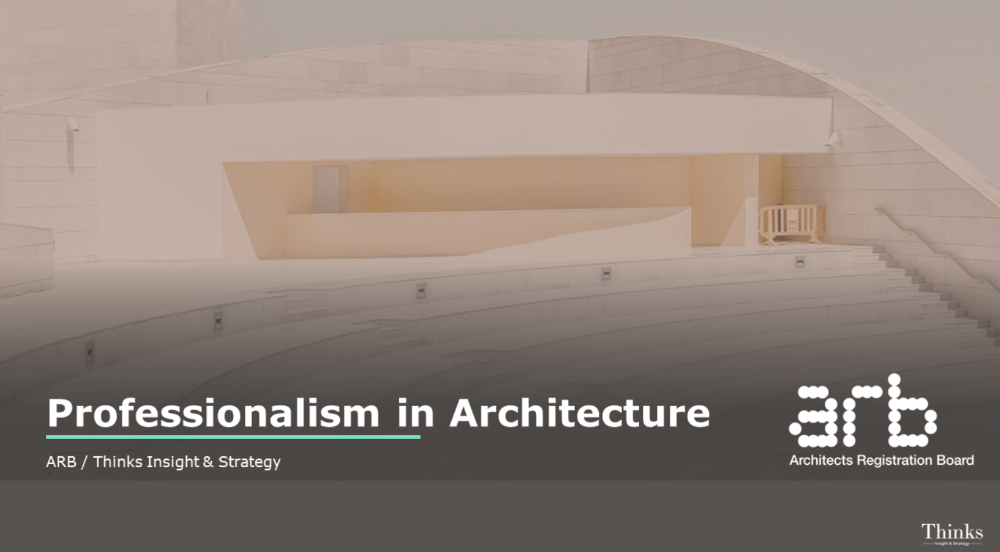ARB proposals for a new Architects Code
[edit] A new Code of Conduct and Practice for Architects
The Architects Registration Board (ARB) published its proposals for a new Code of Conduct and Practice for Architects on September 12, 2024.
The Architects Code is a fundamental text for all architects that defines the principles that they should hold themselves and colleagues to. It explains an architect’s commitments to their clients and the public, and provides a clear framework for safe, ethical and effective practice.
[edit] Six Standards
|
The new draft Code is founded on six Standards, which have been decided following research and engagement with both the public and the profession. Each Standard is underpinned by explanatory text and supported by examples of the behaviours that ARB would expect to see from an architect meeting that Standard. The six Standards are:
|

|
[edit] Key principles of professionalism
The proposals are announced in the shadow of the final Grenfell Inquiry report, published last week. That report underscored some of the key principles of professionalism, such as recognising the boundaries of one’s level of competence, and the paramount importance of safety. These principles are enshrined in the draft Code and the standards it establishes for the profession.
The new Code will be further supported by a suite of guidance on how architects can meet the Standards in specific situations and contexts. The proposals for the individual guidance documents ARB is currently planning to publish are available on the ARB website.
[edit] Comment from ARB
Alan Kershaw, Chair of the Architects Registration Board, said:
“Architects have a profound impact on the health and wellbeing of everyone in our society. Last week’s report following the Grenfell Tower tragedy highlighted how crucial it is that all professions in the built environment maintain their competence and behave in an ethical way.
The Code of Conduct and Practice provides a compass for architects in their practice and describes the standards and behaviours expected of architects by one another, their clients, and members of the public. We’ve designed this new Code through research with the public and workshops with architects, and we’re now consulting on it so that everyone can have their say.”
[edit] Independent research
As the statutory regulator for architects, ARB has a legal requirement to set a code of conduct and practice. The Code has been drafted to respond directly to the expectations of the public and clients as identified through independent research, and insights shared with ARB by architects and other built environment professionals.
The draft Code and the guidance proposals are published for public consultation, in which ARB is seeking the views of architects, students, learning providers, clients, those who work with architects, and those who use the spaces that architects design.
The consultation will be open for three months and is due to close 12 December. Those interested in participating can do so here. Following the consultation’s conclusion, ARB will analyse responses and consider changes to the proposals. The Board intends to finalise the new Code and develop the accompanying guidance in early 2025.
[edit] About ARB
The Architects Registration Board (ARB) is an independent professional regulator, established by Parliament as a statutory body, through the Architects Act, in 1997. It is accountable to government. The law gives ARB a number of core functions:
To ensure only those who are suitably competent are allowed to practise as architects. ARB does this by approving the qualifications required to join the UK Register of Architects.
- ARB maintains a publicly available Register of Architects so anyone using the services of an architect can be confident that they are suitably qualified and are fit to practise.
- ARB sets the standards of conduct and practice the profession must meet and take action when any architect falls below the required standards of conduct or competence.
- ARB sets requirements for and monitors the continuous professional development that architects must undertake, to provide assurance to the public about the continuing competence of the profession.
- ARB protects the legally restricted title ‘architect’.
[edit] Legislation relevant to the Code
Under Section 13 of the Architects Act 1997, it is ARB’s statutory obligation to set a Code of Conduct and Practice for architects. All architects are required to comply with the provisions of the Code.
[edit] The current edition
The Code was last reviewed in 2016 and the current edition has been in place since 2017. The current edition of the Code is based on twelve standards:
- Honesty and integrity
- Competence
- Honest promotion
- Management of your business
- Considering the wider impact
- Working conscientiously
- Trustworthiness and safeguarding client money
- Insurance arrangements
- Maintaining the reputation of architects
- Co-operation with regulatory requirements and investigations
- Having respect for others
ARB first set out its intention to review the Code of Conduct and Practice as part of its 2022-26 Corporate Strategy.
[edit] The proposed guidance
ARB is proposing to support the new Code with a suite of guidance on how architects can meet the Standards of the Code in specific situations and contexts. The proposed topics are:
- Professional indemnity insurance
- Dealing with complaints and disputes
- Financial conduct
- Sustainability
- Terms of engagement
- Raising concerns
- Building safety
- Equality, diversity and inclusion
- Managing conflicts of interest
- Mentoring
- Leadership
[edit] How the new Code has been developed
The Code has been drafted to respond directly to the expectations and insights shared with ARB by architects, the public and clients. The evidence base used as a foundation for the Code includes:
independent research into the needs and expectations of the public and small-scale clients;
feedback from other professionals who work with architects including large scale clients through one-to-one engagement meetings with representative organisations and;
feedback from architects in workshop discussions at a conference and online, and through one-to-one meetings with their national representative institutes.
Some of the findings from those activities include:
- 89% of the public agree that architects have a responsibility to make sure buildings are designed safely e.g. with fire-safe materials;
- 88% of the public think it is important for architects to show integrity and honesty, including with contracts, disputes and client money;
- 87% of the public think it is important that architects communicate clearly, listen to and understand their clients and communities;
- 87% of architects believe that it is important that architects show empathy and consideration to everyone they work with.
This article was issued via ARB News Release "ARB publishes proposals for a new Architects Code" dated 12 September, 2024.
[edit] Related articles on Designing Buildings
- ARB code of conduct.
- Architect.
- Architect's fees.
- Architectural education.
- Architects Registration Board.
- Architectural styles.
- CIAT responds to the architects' regulation review.
- Concept architectural design.
- Hiring an architect as a domestic client.
- Professional conduct.
- Professional indemnity insurance.
- Review of regulation of architects: call for evidence.
- RIBA.
- RIBA Code of Professional Conduct.
- The Architects Act.
- The history of the architectural profession.
- The role of architects.
Quick links
[edit] Legislation and standards
Fire Safety (England) Regulations 2022
Regulatory Reform (Fire Safety) Order 2005
Secondary legislation linked to the Building Safety Act
Building safety in Northern Ireland
[edit] Dutyholders and competencies
BSI Built Environment Competence Standards
Competence standards (PAS 8671, 8672, 8673)
Industry Competence Steering Group
[edit] Regulators
National Regulator of Construction Products
[edit] Fire safety
Independent Grenfell Tower Inquiry
[edit] Other pages
Building Safety Wiki is brought to you courtesy of:








